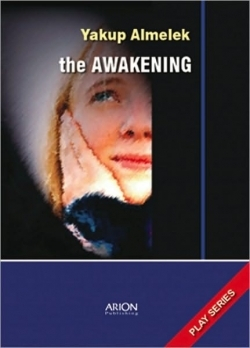
The Awakening
Feeling responsible for the accidental death of a family member is an agonizing condition. Surrounded by a haze of remorse, the survivor inflicts self-punishment or wallows in despair. A tortured mind is not fertile terrain for confidence or achievement. Rather, it is a depleted pasture in which to perish. Goals are nonexistent and passion ceases to live—one definition of hell.
Twenty-eight-year-old Ayla suffers through this nightmare in The Awakening. When she was a teenager she fell out of a boat into the sea, and her father drowned in the rescue. If she had
followed his orders she wouldn’t have fallen into the water, and he would still be alive. As time passes, she never recovers from this trauma and allows herself to succumb to guilt and refuse sound advice. Physically unattractive by choice, Ayla remains inexperienced and is never attracted to men, excluding one heartbreaker who wanted to use her for disreputable reasons.
Finally, she reaches a turning point. Realizing she is no longer a child, Ayla takes a position as an assistant at a medical clinic. There, she meets new friends, yet she must overcome a past that haunts her, even as she gradually emerges from a protective shell. Exploring the depths of a wounded soul takes courage, and for the first time in Ayla’s existence, she allows herself to feel every emotion she has suppressed and releases herself from self-imposed captivity. This is the story of a young woman revitalized and reborn.
Yakup Almelek wrote The Awakening in 1980 while living in Vienna. It is one of his earliest projects. Born in Ankara, Turkey, in 1936, this dramatist has been a prolific writer all his life. Three of his plays have been staged, and one of his short stories was made into a movie. Almelek is the resident playwright for the Complete Theatre Company in New York, where The Awakening will soon be staged. Directed and produced by Annie Ward, it premiers July 7-18, 2010, at Theater Three.
With distinctive dramatic flair and a taste of European culture, Almelek hits a universal chord in this modern play about the need to move on after tragic events devastate the desire to succeed and destroy the will to endure. One’s heart can be filled with youth and joy or age and sadness—a choice everyone makes when life no longer seems worth the effort.
Reviewed by
Julia Ann Charpentier
Disclosure: This article is not an endorsement, but a review. The publisher of this book provided free copies of the book and paid a small fee to have their book reviewed by a professional reviewer. Foreword Reviews and Clarion Reviews make no guarantee that the publisher will receive a positive review. Foreword Magazine, Inc. is disclosing this in accordance with the Federal Trade Commission’s 16 CFR, Part 255.
